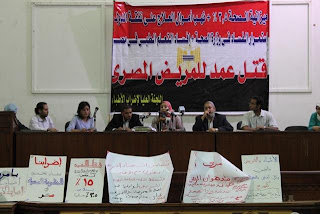Doctors strike for health-care reform, better conditions
Tue, 10/05/2011
Jano Charbel

Egypt's doctors on Tuesday held the first general strike in the history of the Doctors Syndicate to call for health care reform and improved working conditions for doctors. The strike comes in the wake of mob attacks on a number of hospitals and medical staff.
The organizing committee threatened to resume a general strike on 17 May if their demands are not met.
"This general strike has been in the making for three years. The straw that broke the camel's back is the recent attacks on hospitals and doctors," said Rashwan Shaaban, a member of the strike committee at the Doctors Syndicate in Cairo.
Primary demands include overhauling the existing healthcare system, which the doctors call corrupt and inefficient, sacking interim Health Minister Ashraf Hatem, impeaching Doctors Syndicate President Hamdy al-Sayyed, and increasing the allocation of the national budget from the current 3.5 percent for health services to 15 percent.
The strike committee argued that allocating 15 percent of the national budget is required in order to improve doctors' salaries and working conditions and provide adequate medical services for patients.
Sayyed, the syndicate’s head since 1992 and a member of the recently dissolved National Democratic Party (NDP), has threatened to take disciplinary action against the strike committee and doctors participating in the general strike. Sayyed warned against harming patients' right to healthcare as a result of the strike.
"I'm opposed to this strike by doctors because there are so many patients that need medical attention all across the country. Doctors should serve to improve healthcare, not ruin it," said Om Mahmoud, a passerby outside the syndicate headquarters.
According to the strike committee, however, emergency rooms were fully functioning , as were intensive care wards. Operations and surgeries were not affected as a result of the strike, and the treatment of serious illnesses and medical conditions were unhampered.
"We are proud to announce that not a single patient who was in need of urgent medical attention was harmed in the course of this strike," said Shaaban.
"Only cosmetic procedures may be halted during the strike, like Lasik eye surgery and beautification operations, etc." said Dr. Mohamed al-Banna, a member of the Muslim Brotherhood and the chargé d'affaires of the syndicate's Alexandria branch.
The Brotherhood initially received criticism from the strike committee after leading members voted against the general strike.
"On 1 May the general assembly voted for the strike by a majority of those present,” Banna said. “Some members of the Brotherhood voted for, and some voted against the strike. In any case, we respect the decision of the majority and will abide by the general assembly's vote."
However, Banna characterized demands for dismissing the health minister as “unrealistic,” and said he opposes Sayyed’s impeachment.
"Sayyed is one of the best and most effective union presidents,” Banna said. “It doesn't matter if he's a former member of the NDP."
He stated that such a motion would require the votes of at least half the 230,000 general assembly members to pass, and to commence impeachment procedures.
Mona Mina, a member of the strike committee and of Doctors Without Rights, an advocacy group for the improvement of Egyptian healthcare services, disagreed. "Sayyed has been president of the syndicate for the past 20 years, and chief of the Parliamentary Health Committee for nearly 25 years. He presided over the deterioration of national health services during this time," said Mina. She insisted on the legitimate right of doctors to strike.
"The existing health system serves to abuse the rights of both doctors and patients," she said, adding that "rumors abounded today regarding the cancellation of the strike by the Health Ministry. Yet the strike was not called by the ministry in the first place. These rumors served to divide the ranks of striking doctors."
A blacklist of strike breakers, especially the directors of hospitals and medical institutes, was announced at a conference held at the Doctors' General Syndicate today.
The governorates with the greatest percentages of strikes were Port Said, Ismailia, Suez, Kafr al-Sheikh, Mansoura, and Qalyubiya, where it was estimated that 100 percent of doctors took part in the strike.
Ninety percent of doctors went on strike in the governorates of Beheira, Sharqiya, Monufiya, and Alexandria, while around 70 to 80 percent of doctors in Cairo are said to have participated. The governorate of Aswan was nearly strike-free.














No comments:
Post a Comment